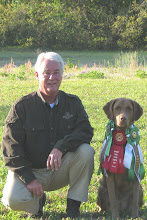It is time to begin this journey into understanding dogs, as dogs...not furry humans, not as our vicarious children, not as some kind of livestock bred for our use, or entertainment..but most of all, not as an extension of who we are personally. If we truly want to understand dogs, we must divest ourselves of ourselves, and look...as objectively as we can...at dogs just being dogs.
‘...dogs just being dogs.’ is a loaded statement that begs to be unpacked. There are, currently, two evolutionary views of dogs. One view holds that dogs are the direct descendants of wolves. Wolves are Canis lupus, and dogs are their direct descendants, Canis lupus familiaris. In this view dogs were wolves until sometime in the relatively recent past (about 15,000 years ago) when dogs became domesticated by humans. The other view is that dogs and wolves had a common ancestor, and branched into different species Canis lupus (wolves), and Canis familiaris (dogs) around a half-million years ago This view implies that dogs domesticated themselves as a natural adaptation to a ecological niche that was concurrently evolving (the agricultural revolution), and involved co-evolution with humans. See http://newguinea-singing-dog-conservation.org/Tidbits/OriginOfTheDog.pdf and http://www.nonlineardogs.com/socialorganisation.html for a more in-depth discussion.
What does it matter? I mean, really? Dogs are dogs are dogs...by any other name. Well, I think it matters very much. If you think your dog is a direct descendant of wolves, then the way wolves behave, individually and socially will provide a blueprint for the way your dog behaves, and also provide clues for how you should attempt to modify your behavior in order to modify your dog’s behavior to make it more acceptable to humans, i.e – communicate with your dog as if he were a wolf. This leads us into the surreal world of ‘Pack Theory’ and ‘Dominance Theory’, which in its original form has been critically challenged if not debunked entirely. If, on the other hand, you view dogs as co-evolving with humans, you will have to consider how to effectively communicate with an animal that has evolved¸ naturally, to communicate with you, and therefore, has a voice in the conversation.
So, what is your view of dogs? What do you think about dogs, and why do you think that way?
Sunday, March 28, 2010
Subscribe to:
Comments (Atom)
